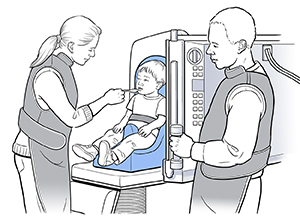When Your Child Needs a Modified Barium Swallow
When Your Child Needs a Modified Barium Swallow
A modified barium swallow is a test used to check your child’s ability to swallow. It is also called a video fluoroscopic swallowing exam or an oropharyngeal motility study. Barium, a substance that makes organs show more clearly on X-rays, is used during the test. This test may be suggested if your child has problems swallowing food. Problems may include wheezing, choking, or aspiration (when food or liquid goes into the lungs) or suspected reflux (GERD). This test can also check if your child is ready to move from tube feeding to oral feeding. The image part of the test takes about 15 to 20 minutes.
Before the test
Here is what you will need to do:
Don’t give your child anything to eat or drink 4 to 6 hours before the test. Talk with the healthcare provider if medicines need to taken.
Follow all other instructions given by the healthcare provider.
Let the technologist know
For your child’s safety, let the technologist know if your child:
Has allergies to iodinated contrast material
Has allergies to medicines
Has any health problems
Has had surgery
Is or may be pregnant
Is taking any medicines
During the test
A modified barium swallow is performed by a speech pathologist or feeding specialist. These are people with training to help patients with swallowing or feeding problems. A radiologist is also present. This is a healthcare provider trained to use X-rays to test and treat patients:
You can stay in the X-ray room and can help by feeding your child. You’re given a lead apron to wear for your safety. Pregnant women aren’t allowed in the X-ray room.
The X-ray table is set upright. Your child is seated in a special chair that is placed against the X-ray table.
Your child is given foods and liquids of different textures to swallow. This may include thin liquids, such as water; thick liquids, such as milk; or thick foods; such as pudding. The foods and liquids are coated with barium. Your child may not like the taste of the barium.
The speech pathologist or feeding specialist watches your child’s swallowing. Your child is checked for any signs of problems as each food or liquid is swallowed.
An X-ray video recording is also taken of your child’s upper GI tract as each food or liquid is swallowed.
After the test
Here is what to expect:
The X-ray video and notes from the test are studied. You’ll be advised about what foods or liquids are safe for your child.
Your child may not be ready to swallow foods yet and may need to be fed by another method. Your child’s healthcare provider will tell you more if this is needed.
If your child can drink liquids, drinking water helps relieve constipation that may happen after the test. Call your healthcare provider if your child does not have a bowel movement after 24 hours.
Your child’s stool may appear chalky white or light for 1 to 2 days due to the barium. If no barium is passed within 24 hours, call the healthcare provider.
Helping your child prepare
You can help your child by preparing in advance. How you do this depends on your child’s needs:
Explain the test to your child in brief and simple terms. Younger children have shorter attention spans, so do this shortly before the test. Older children can be given more time to understand the test in advance. It may help your child to know that you may be doing the feeding during the test. You may even be allowed to bring samples of food that you know your child likes.
As best you can, describe how the test will feel. Allow your child to ask questions.
Use play when helpful. This can involve role-playing with a child’s favorite toy or object. It may help older children to see pictures of what happens during the test.
Possible risks and complications of a modified barium swallow
These include the following:
Allergic reaction (such as hives, itching, or wheezing) to barium
Aspiration
Constipation and bowel obstruction due to retained barium
Radiation exposure from X-rays
Updated:
October 03, 2017
Sources:
Aspiration due to swallowing dysfunction in infants and children. UpToDate.
Reviewed By:
Bass, Pat F. III, MD, MPH,Grossman, Neil, MD,Image reviewed by StayWell medical illustration team.
